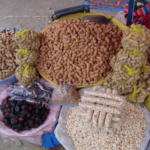


Fundacion AGRECOL Andes
Bolivia
8/2019—8/2022
Agroecological markets are essential for incentivizing agroecological production. Almost all farmers interact with markets to some degree, but most are not getting a fair price for their agroecological production, which often leads to farmers using subsidized agrochemicals or abandoning agriculture altogether. During the previous phase of this CCRP-funded project, the team learned that 80% of Cochabamaba consumers interviewed—in a diversity of markets—did not know what “ecological” means. This underscores the importance of consumer awareness and demand for agroecological production. In addition, many bottlenecks prevent farmers from accessing agroecological markets, including production, transport, logistics, and marketing hurdles. Decades of work in Bolivia and Cochabamba have promoted short circuit markets and family farms to consumers, but only minimal work has occurred to raise awareness about agroecology. Agrecological products remain a niche market for the upper class, tourists, and alternative movement consumers. In the proposed next phase, the project will further investigate how to expand this market as well as explore options for producers to access the market.
Agroecological markets are essential for incentivizing agroecological production. Almost all farmers interact with markets to some degree, but most are not getting a fair price for their agroecological production, which often leads to farmers using subsidized agrochemicals or abandoning agriculture altogether. During the previous phase of this CCRP-funded project, the team learned that 80% of Cochabamaba consumers interviewed—in a diversity of markets—did not know what “ecological” means. This underscores the importance of consumer awareness and demand for agroecological production. In addition, many bottlenecks prevent farmers from accessing agroecological markets, including production, transport, logistics, and marketing hurdles. Decades of work in Bolivia and Cochabamba have promoted short circuit markets and family farms to consumers, but only minimal work has occurred to raise awareness about agroecology. Agrecological products remain a niche market for the upper class, tourists, and alternative movement consumers. In the proposed next phase, the project will further investigate how to expand this market as well as explore options for producers to access the market.
Regional research continues to show that almost all farmers participate in markets at some point during the year, unlike other regions where subsistence farming was more prominent. In the Andes, this is not new; trade and barter across altitudinal levels is essential for eating a nutritional diet and complex trade relationships go back millennia. Market access is also one factor contributing to rural vibrancy and stemming the tide of economic migrants. Nonetheless, it is difficult to research and change markets. The CCRP Andes project cohort, including Eco-Consumers, has spent a lot of time on both grassroots campaigns and innovating methods for better understanding market dynamics. For more than two decades, AGRECOL Andes has been a leader on advocacy for supporting local markets within the Cochabamba foodshed, which uniquely positions the organization to do this work.
The overall objective is to influence consumer behavior towards responsible consumption at fairs in the metropolitan area of Cochabamba, and to improve commercialization conditions for small-scale agroecological family farmers and capture that learning for a wider audience. Other outcomes include:

